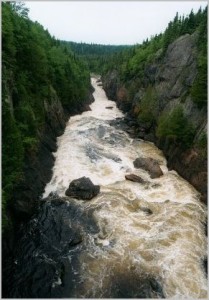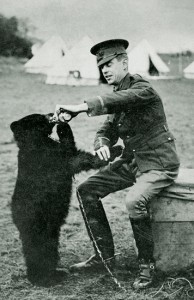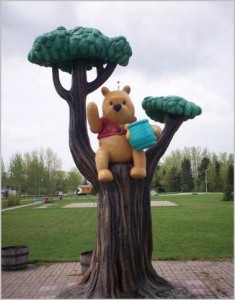Written by Mike. I’m not sure why we did it, but in 2003 my wife and I drove across Canada with our four year old son.

White River, Ontario (Thanks to Larry’s Canoe Journal – click to read)
It was a strange journey which included a 1000 miles of prairie land, bears racing us along the Trans Canadian Highway and our car blowing up in the forests of western Ontario. One of the many quirky moments included coming across the true story of Winnie the Pooh and her contribution to the First World War. It started off when we stopped off at a small town called White River half way between Sault Ste Marie and Thunder Bay ….
In August 1914, Harry Colebourn a vet from Winnipeg Manitoba, was on his way to the Western Front. Lieutenant Colebourn was born in England in 1887 and emigrated to Canada at the age of 18. As with many Canadians born in England, there was still a close attachment to the ‘old country’ and Harry immediately volunteered to serve. White River had been built as a stop off point by the Canadian Pacific Railway in 1885 and became an important trading centre; it was also the place where Harry stayed whilst on his way to England and France. It was here he came across a trapper who had a young black bear to sell, having killed the mother. The area had a number of bears owned by local people and White River was a good market where a very good price could be fetched. Harry paid $20 for the bear, being worth over $400 today in 2012.
Little did Harry know that this $20 was going to affect millions of children around the world. A sequence of events now takes place.
Harry was a part of the Fort Garry Horse Regiment at the time and they were well equipped to transport horses across the Atlantic in support of the war effort. Plus a small black bear it seems. Harry had by this time made up his mind about the name of the bear. He had found a home in Winnipeg, Manitoba, and decided to name the bear Winnipeg, or ‘Winnie’ for short.
Just down the A303 (M3 from Wokingham) are the Salisbury Plains, home for many of the soldiers training for war across the Channel and home too for Harry, his Regiment and also the fast growing Winnie. An affectionate bear and well loved by the troops, Winnie was nevertheless growing at the kind of pace that black bears do and the playful climbing of the tent poles were becoming an increasingly dangerous piece of playtime japes. A decision was going to have to be made as it was becoming clear that trench life was not going to suit Winnie or any of the soldiers who might be in close proximity. Harry therefore lends Winnie to London Zoo in December 1914, promising to return to collect at the end of the war. Winnie became such a star at the zoo, that Harry turned the loan into a gift in 1918. Winnie was the only animal allowed to play with children and would lick jam off their hands as a special trick.
As the crowds grew and Winnie’s name achieved national recognition, a man and his son decided to join the queue. AA Milne and his son Christopher Robin were so taken by the sight of Winnie that they started to make up stories about the bear on returning home. Christopher Robin had a bear called ‘Edward’ which was immediately changed to Winnie and his pet swan also donated his name, ‘Pooh’. Winnie the Pooh was now the subject of AA Milne’s stories and the rest we know. Winnie was to live at the zoo until her death in 1934, aged 20. Fame had already spread further after the Winnie the Pooh stories were first published in 1926, but did Harry make it through the war? Yes he did, returning to visit Winnie whenever he could until her death. Harry died in 1947 aged 60.
Did the trick with Winnie licking those hands disturb you a little? After our time in White River and hanging around in Wawa to buy a new car, we made our way to the Rockies in Alberta. The Information Centre there implored all visitors to go nowhere near the bears if one was seen. They are very dangerous as you would expect. Apparently, not long before our visit a mother had coated her child’s hand in jam, which was then offered to a bear to lick off. The bear took off half the child’s arm. Who would do that? I was so shocked by this story, I tried to track it down, without success, but found a website which clearly spells out the dangers. My brother worked with a bear on a paper tissue commercial. He was naturally intimidated by the presence of this eight foot grizzly and was somewhat relieved when filming was interrupted when the bear escaped from its cage. It disappeared for three weeks in the Scottish Highlands and caused something of a national outcry. His name was Hercules – the bear, not by brother.
See how the mind wanders when you start reading Wokingham Remembers ?



Only just read your observations (June, 2015, what it is to be elderly…) and can add ‘Yes White River is right there near Wawa…’ I’ve always believed it was the Winnipeg Fusiliers, now I think it was the 99th Winnipeg Rifles, known as ‘The Little Black Devils’ (Google their capbadge) also listed as The 8th Battalion – part of ‘The Originals’ ie the First Canadian Contingent to leave for Europe in 1914. Gt Uncle of a friend of mine was in them; died of wounds May, 1917, one month after they swept Vimy Ridge clear of Germans. In any event, whoever brought ‘Winnie’ into our world did a world of good! Sorry about the car breakdown, Canada usually tries to look after guests. Incidentally, I now live in Ireland.
http://www.just-pooh.com/history.html
http://www.poohcorner.com/A-Short-History-of-Pooh-and-Winnie.html